|
|
|
Sort Order |
|
|
|
Items / Page
|
|
|
|
|
|
|
| Srl | Item |
| 1 |
ID:
178812


|
|
|
|
|
| Summary/Abstract |
The UK government's policy of support for shale gas extraction ended in November 2019 with the imposition of a moratorium on fracking (hydraulic fracturing) in England, and an admission that the policies to manage induced seismicity were insufficient. However, ambiguities remain regarding its scope, despite attempts at clarification. The concept of fracking to improve hydrocarbon production has evolved from defining a specific engineering process, using high volumes of water, to encompass other ‘unconventional’ methods to achieve the same end. We resolve the various definitions in a scientific, technical, regulatory and legislative context, robustly define unconventional extraction methods (circumventing the need to identify and quantify the various technologies available), and advocate the precautionary principle in drafting and interpreting regulations. Policy should be driven by the engineering of the bulk physical characteristics of the target rock, rather than by the current definitions based on injected fluid volume. To meet climate change concerns, the moratorium should be converted into a ban. In the interim, we argue that, in order to comply with the government's policy of ensuring safe and sustainable operations, the moratorium should be extended to all well stimulation treatments for unconventional hydrocarbon extraction, including acid stimulation.
|
|
|
|
|
|
|
|
|
|
|
|
|
|
|
|
| 2 |
ID:
180126


|
|
|
|
|
| Summary/Abstract |
High volume hydraulic fracturing (HVHF) is a contentious issue worldwide. It is a crucial policy issue due to its significant impact on multiple stakeholders and, as a result, requires extensive public consultation and exposure. One process deployed in some liberal democracies to address this controversy is forming an independent expert review panel to receive public submissions and then prepare a report for policymakers. Our paper investigated how closely the review panel reports reflect and weigh the public submissions and to explore the subjects in which there is agreement or disagreement across the various reports. This study used the Leximancer automated text analysis software to compare key themes in the sub-national reports and public submissions. We find a consistent pattern across jurisdictions of public submissions reflecting health and environment while official reports focus on industry and economic development. There is a wide range of congruency between the jurisdictions on the capacity of the expert reports to reflect public opinion. Following from this divergence, we aim to contribute to more meaningful discussions regarding effective communication strategies between the government and the public to ensure review panel reports fairly represent public concerns.
|
|
|
|
|
|
|
|
|
|
|
|
|
|
|
|
| 3 |
ID:
130458


|
|
|
|
|
| Publication |
2014.
|
| Summary/Abstract |
The energy business has a way of making smart people look dumb. Experts were blindsided by the shale revolution in the United States. For most of the last few decades, they had assumed that U.S. domestic energy supplies were dwindling. Then, advances in horizontal drilling and hydraulic fracturing, or "fracking" -- the injection of high-pressure streams of sand, water, and chemicals into underground shale and other rock to unlock oil and natural gas trapped there -- significantly boosted total U.S. natural gas production, by as much as 25 percent in recent years, forcing many experts to change their tune. Horizontal drilling and fracking are now having an even bigger impact on domestic oil production: five years ago, most new onshore rigs were drilling for shale gas, but today, most are drilling for oil in shale and so-called tight rock formations. Experts are confidently pointing to the benefits of abundant supplies of this unconventional oil and gas for the U.S. economy: lower energy costs, new jobs, and even a revival in some parts of the manufacturing sector. Politicians from both parties, meanwhile, are vying to be the most enthusiastic boosters of domestic natural gas.
|
|
|
|
|
|
|
|
|
|
|
|
|
|
|
|
| 4 |
ID:
171412


|
|
|
|
|
| Summary/Abstract |
The land-use impacts of the rapid expansion of U.S. oil and gas infrastructure since the early 2000s are a focus of local, state, and federal policymakers. Agriculture is the dominant land use in many areas with active energy development. Prior studies find that energy development displaces agriculture and assume that this effect is both permanent and homogeneous. We take a novel approach, analyzing landowners' capacity to both anticipate displaced production prior to the drilling of oil and gas wells, and reclaim some land once wells are in production. Using North Dakota's Bakken Shale as a case study, we merge agricultural land-use data from 2006 to 2014 with locations and drilling dates of oil and gas wells. We then use panel fixed-effects models to estimate the spatially- and intertemporally-heterogeneous effects of additional wells on agricultural land. We find that drilling is associated with reduced surrounding crop cover and increased fallow acreage. Importantly, the duration of these effects differs across agricultural land covers, and effects are in some cases temporary. Our analysis suggests that overlooking dynamic land use impacts may overestimate the cumulative net impact of oil and gas development on agricultural land uses by up to a factor of two.
|
|
|
|
|
|
|
|
|
|
|
|
|
|
|
|
| 5 |
ID:
149886
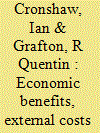

|
|
|
|
|
| Summary/Abstract |
We review the economic benefits and external costs of unconventional gas production (UCG) in the United States from a policy perspective. Based on an overview of state regulation in Pennsylvania, a state that has witnessed very rapid growth of gas production over the past 5 years, and global experiences we present 10 key principles that are proposed to reduce the risks and to increase the net rewards of UCG. Application of these principles has the potential to reduce the risks of UCG, especially at a local level, while maximizing the benefits of gas developments.
|
|
|
|
|
|
|
|
|
|
|
|
|
|
|
|
| 6 |
ID:
186484


|
|
|
|
|
| Summary/Abstract |
Shale gas exists in abundant quantities around the world and could augment conventional natural gas supplies. However, shale gas exploration through the fracking process is associated with negative connotations and is opposed in many countries because of the perceived environmental impacts including water contamination and competition with other water demands. In this context, the contribution of this work is to analyze the long-term impact of fracking water demand on water availability and possible contamination in Brazil. The objective is to estimate the long-term impacts of shale gas development in Brazil considering the water demand and propose regulations to address water withdrawal and contamination concerns based on best practices from around the world as a way forward. The study demonstrates that competition for water by prospective fracking activities in Brazil in comparison to available water resources and other water demands in associated hydrological basins is insignificant. Furthermore, an analysis of policy and regulations identify policy and regulatory recommendations that may ameliorate public concerns about fracking impact on water by enforcing compliance from exploration and production companies. Following this study, other countries can estimate their shale gas exploration realities to determine the impact of fracking impact on water resources.
|
|
|
|
|
|
|
|
|
|
|
|
|
|
|
|
| 7 |
ID:
149899


|
|
|
|
|
| Summary/Abstract |
The development of shale gas in the United Kingdom (UK) using hydraulic fracturing, more commonly known as ‘fracking’, remains in its infancy. Yet understanding public attitudes for this fledgling industry is important for future policy considerations, decision-making and for industry stakeholders. This study uses data collected from the University of Nottingham, UK nationwide online survey (n=3823) conducted in September 2014, to consider ten hypothesises about the UK public's attitudes towards shale gas. From the survey data we can see that 43.11% of respondents support shale gas extraction in the UK. Furthermore, our results show that women, class DE respondents, non-Conservative party supporters, and respondents who positively associate shale gas with water contamination or earthquakes are less likely to support the extraction of shale gas in the UK. We also discuss potential policy implications for the UK government arising from these findings.
|
|
|
|
|
|
|
|
|
|
|
|
|
|
|
|
| 8 |
ID:
175228
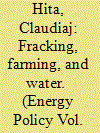

|
|
|
|
|
| Summary/Abstract |
Several studies note the large quantity of water used to hydraulically fracture oil and gas wells. We quantify this water use and its effects on water use for irrigating crops. For nine western states in 2017, water use in fracking represented 1.7 percent of water use in irrigation overall, but up to 55 percent in the Bakken shale of North Dakota, 28 percent in Oklahoma shale regions, and 12 percent in the Eagle Ford shale of Texas. However, in counties where the percentage of water use for fracking relative to irrigation is large, it is primarily because such counties have had minimal historical irrigation. We analyze the effect of state water policies governing the transfer of water from farming to fracking on water withdrawals for the two sectors. In North Dakota, which allowed farmers to forego irrigating and sell water to energy firms, each acre-foot of water used in fracking displaced about 1.1 acre feet from irrigation, thereby avoiding an increase in total withdrawals. Weaker evidence suggests an increase in irrigation in Oklahoma and Texas. Because of the lack of displacement in Texas and Oklahoma, concerns that fracking contributes to excess withdrawals in the present time may be warranted.
|
|
|
|
|
|
|
|
|
|
|
|
|
|
|
|
| 9 |
ID:
150038


|
|
|
|
|
| Summary/Abstract |
A growing area of research has addressed public perception of unconventional oil and natural gas development via hydraulic fracturing (“fracking”). We extend this research by examining how geographic proximity to such extraction interacts with political ideology to influence issue support. Regression analysis of data from a fall 2013 national telephone survey of United States residents reveals that as respondents’ geographic distance from areas experiencing significant development increases, political ideology becomes more strongly associated with issue support, with the liberal-partisan divide widening. Our findings support construal level theory's central premise: that people use more abstract considerations (like political ideology) the more geographically removed they are from an issue. We discuss implications for studying public opinion of energy development as well as for risk communication.
|
|
|
|
|
|
|
|
|
|
|
|
|
|
|
|
| 10 |
ID:
175251
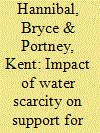

|
|
|
|
|
| Summary/Abstract |
The rise of unconventional oil and gas development in the form of hydraulic fracturing, or fracking, has drawn much attention from media, scholars, and policy makers, and Texas has frequently been the epicenter of this attention. This paper looks at fracking through a particular lens, that of an extraction process that relies heavily on water. This “water-energy nexus” has been studied in terms of the physical connections, but little research exists on how ordinary people might understand that nexus. This paper examines the effect of people's awareness of the water-energy nexus and county-level drought characteristics on their support for increased regulation of water issues associated with hydraulic fracturing. The analysis uses data from a Texas-based public opinion survey, and county-level data from the U.S. Drought Monitor and the Texas Railroad Commission. Multi-level modeling techniques are used to examine the impact of proximity, local water scarcity, and individual awareness of the water-energy nexus on people's willingness to support regulating aspects of water in hydraulic fracturing practices. The paper supports the hypothesis that individual awareness of the energy-water nexus and local water scarcity affects willingness to support greater regulation and concludes with some policy recommendations to improve policy transparency surrounding hydraulic fracturing.
|
|
|
|
|
|
|
|
|
|
|
|
|
|
|
|
| 11 |
ID:
166372
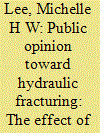

|
|
|
|
|
| Summary/Abstract |
A survey with an embedded experiment was conducted to test how residents would respond to a commitment by oil and natural gas producers to conduct nearby fracking operations in a manner that is more protective of health and the environment than existing state and federal regulations. The experiment specifically assessed how the use of independent third-party certification of operations coupled with "beyond compliance" practices would influence local public support for oil and gas development. The state of Colorado was chosen due to its long history of oil and gas development, its leadership amongst states in advancing fracking, and the current local-level conflicts surrounding oil and gas development. A public opinion survey (N = 390) of a representative sample of Colorado residents found that "green certification" of a production company's activities led to substantially increased levels of support for a hypothetical nearby oil and natural gas project. Our findings suggest that oil and gas developers can obtain greater public support for their projects by voluntarily engaging in practices that are more protective than current state and federal regulations together with third-party certification of those practices. In effect, these coupled actions serve as a mechanism that promotes a firm's "social license to operate".
|
|
|
|
|
|
|
|
|
|
|
|
|
|
|
|
| 12 |
ID:
166500
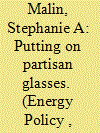

|
|
|
|
|
| Summary/Abstract |
Unconventional oil and gas technologies—such as hydraulic fracturing—have drastically increased the volume of oil and gas produced in the U.S., while simultaneously bringing drilling closer to residential areas. We examine quality of life impacts of unconventional oil and gas production, arguing that how people perceive its local effects is rooted in their political identities. Using survey data from three northern Colorado communities, we employ counterfactual mediation methods to understand relationships between political identity, perceived socio-environmental and community changes from oil and gas development, and self-reported quality of life. We find significant differences in how people perceive local development based upon political identity, whereby Tea Party supporters see little negative impact, and in turn are likely to believe that local development improves their quality of life. At the other extreme, Democrats perceive more negative community changes from oil and gas development and are more apt to believe that it reduces their quality of life.
|
|
|
|
|
|
|
|
|
|
|
|
|
|
|
|
| 13 |
ID:
104980


|
|
|
|
|
| Publication |
2011.
|
| Summary/Abstract |
The ability to economically produce natural gas from unconventional shale gas reservoirs has been made possible recently through the application of horizontal drilling and hydraulic fracturing. This new technique has radically changed the energy future of the United States. The U.S. has shifted from a waning producer of natural gas to a growing producer. The Energy Information Administration forecasts that by 2035 nearly half of U.S. natural gas will come from shale gas. Texas is a major player in these developments. Of the eight states and coastal areas that account for the bulk of U.S. gas, Texas has the largest proved reserves. Texas' Barnett Shale already produces six percent of the continental U.S.' gas and exploration of Texas' other shale gas regions is just beginning. Shale gas production is highly controversial, in part because of environmental concerns. Some U.S. states have put hydraulic fracturing moratoriums in place because of fear of drinking water contamination. The federal government has gotten involved and some states, like Texas, have accused it of overreaching. The contention over shale gas drilling in the U.S. may be a bellwether for other parts of the world that are now moving forward with their own shale gas production.
|
|
|
|
|
|
|
|
|
|
|
|
|
|
|
|
| 14 |
ID:
137220
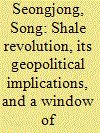

|
|
|
|
|
| Summary/Abstract |
The shale oil and gas production boom has played a significant role in bringing about the recent precipitous fall in oil and gas prices, and in catapulting the United States into first place for oil production last year, ahead of Saudi Arabia. A number of factors at the core of the boom in the United States have contributed to its success: the combination of technological breakthroughs (e.g., horizontal drilling and hydraulic fracturing); talented entrepreneurship; a business-friendly financial
market; technological R/D initiatives supported by the government; favorable geological conditions; and the property-rights regime. The EU and Asia also stand to gain from the shale windfall; Russia, Saudi Arabia, Iran, and other OPEC members, on the other hand, are facing seriously negative impacts. Northeast Asia—particularly the Republic of Korea (ROK), China, and Japan—may have an
opportunity to benefit from the “Shale Revolution,” with the potential emergence of natural gas trading hubs in the region. This paper seeks to (1) identify the current status of the Shale Revolution, including the factors responsible for its success and the role of entrepreneurship in the shale breakthrough; (2) examine the geopolitical implications of the shale boom on important global players; and (3) explore the window of opportunity that is now open to nations in the Northeast
Asia region related to the Shale Revolution.
|
|
|
|
|
|
|
|
|
|
|
|
|
|
|
|
| 15 |
ID:
166539


|
|
|
|
|
| Summary/Abstract |
In 1980, solid waste from oil and gas fields was exempt from US federal hazardous waste regulations (according to the US Environmental Protection Agency's Resources Conservation and Recovery Act, RCRA). However, recent developments in oil and gas extraction from deep shale formations warrant a closer look at this exemption. We obtained lab reports submitted to state regulators to characterize the solid waste generated from 231 shale gas wells in Pennsylvania. Of the 40 chemicals listed as toxic in RCRA, eight were present in our samples and two exceeded RCRA toxicity limits for classification as a hazardous waste (Ba and Cr). We also found overlap with chemicals listed in international lists of toxicity, suggesting that these wastes could pose health problems that would not be regulated by RCRA. Radiation in solid waste is regulated at the state-level; the maximum detected concentrations of radium-226 and radium-228 (51 picocuries/g and 8.87 picocuries/g, respectively) exceed the regulatory limits for landfills in Ohio and New York, however it is common practice to ship waste across state lines. Removing the RCRA oil and gas exemption would increase testing and reporting burdens but would leave most shale waste management practices unchanged while protecting against some hazardous outliers.
|
|
|
|
|
|
|
|
|
|
|
|
|
|
|
|
| 16 |
ID:
166499


|
|
|
|
|
| Summary/Abstract |
Shale gas extraction is a highly controversial process. Despite significant proven or potential reserves, public reaction to extraction have often been negative. In some cases, this has prevented exploration. In this paper, we investigate the structure of public attitudes to shale gas extraction in the context of the United Kingdom, using a dedicated survey of 4992 respondents. We find that public attitudes to shale gas extraction have a unidimensional structure, such that all questions about the virtues and limitations of extraction are treated as a single issue. Nonetheless, this general structure masks two distinct attitudinal structures. Those with more familiarity with shale gas have a very strong unidimensional attitudinal structure, while those with the least familiarity have a two-dimensional attitudinal structure; representing distinctions between perceived positive and negative attributes. This suggests an important role for information in conditioning responses to shale gas, a factor with implications for how government addresses policy relating to shale gas extraction.
|
|
|
|
|
|
|
|
|
|
|
|
|
|
|
|
| 17 |
ID:
186461
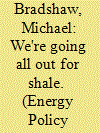

|
|
|
|
|
| Summary/Abstract |
In January 2014, then British Prime Minister David Cameron declared that his government was ‘Going all out for Shale.’ In November 2019, during an election campaign, Prime Minister Boris Johnson's Conservative Government imposed a moratorium on hydraulic fracturing bringing to a halt industry hopes of developing shale gas in the UK. This paper explores what happened, integrating research employing a mixed methods research design including a review of the literature, expert interviews, household interviews, a series of nationally representative and local surveys, and a content analysis of political testimony. It starts with a brief history of the shale gas debate in the UK and social science research on the issue. It then examines the UK's Shale Gas landscape, and in particular energy policy failure, by considering three issues: first, the framing of the shale gas debate in the national Parliament, exploring the arguments for and against it; second, changing public perceptions and attitudes towards shale gas development; and third, the attitudes and lived experiences of the communities most affected by shale gas exploration activities. These three dimensions are combined to explain the UK Government's shale gas failure to-date. The paper concludes by identifying the lessons learnt from the Government's initial policy failure, both in relation to further shale gas exploration, but also for other technologies required for a future Net-Zero energy system.
|
|
|
|
|
|
|
|
|
|
|
|
|
|
|
|
|
|
|
|
|